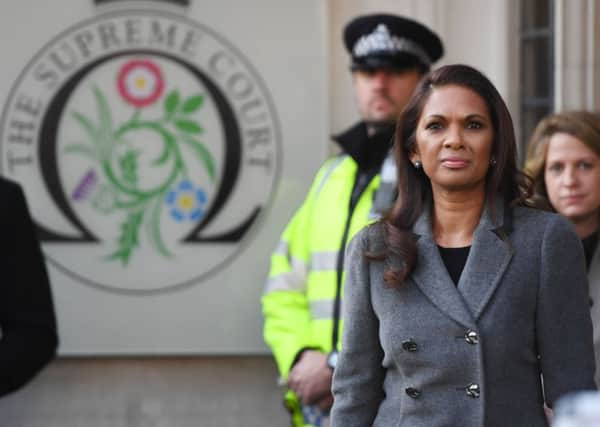UK Government fights for the right to trigger Brexit


Eleven Supreme Court justices – a record to hear an appeal – are considering the challenge over the country’s Brexit strategy in what will be the most televised UK case ever.
Last month three High Court judges said Theresa May lacked power to use the royal prerogative to trigger Article 50 of the Lisbon Treaty and start negotiating Brexit without Parliament’s authrity.
Advertisement
Hide AdAdvertisement
Hide AdNow the justices will have their say in the most important constitutional cases in UK legal history.
The Government’s top law officer, Attorney General Jeremy Wright, said the High Court had reached the “wrong” decision and it was for the Government to exercise prerogative powers in the conduct of the UK’s affairs on the international plane.
He told the judges triggering Article 50 “will not be an exercise of the prerogative right on a whim or out of the blue”, but was part of a process in which “Parliament has been fully and consciously involved”.
Mr Wright said the use of the prerogative in the circumstances would be lawful. The prerogative was not “an ancient relic”, but a “constitutional necessity”.
Advertisement
Hide AdAdvertisement
Hide AdHe said the legislation enabling the EU referendum had been passed with the “clear expectation” the Government would implement the result and that Parliament had had the opportunity to restrict the Government’s power to trigger Article 50, but had chosen not to do so.
He said: “If this is all about standing up for Parliament, I say Parliament can stand up for itself.”
James Eadie QC, also representing the Government, described the prerogative as “a long-standing, well-recognised set of powers firmly established in our constitutional arrangements”.
If the appeal is unsuccessful, and any potential further appeal to the European Court of Justice in Luxembourg also fails, the Government’s plans for Brexit could be thrown into disarray.
Advertisement
Hide AdAdvertisement
Hide AdMrs May still intends to give an Article 50 notification by the end of next March to start the leave negotiations.
Lord Neuberger, the court’s president, said all parties had been asked whether they wished any of the judges to stand down. He said individual members of the public in the case had received “threats of serious violence and unpleasant abuse in emails” and warned those responsible that “legal powers” existed to deal with them.
He said: “Threatening and abusing people because they are exercising their fundamental right to go to court undermines the rule of law.”
Scotland’s top law officer, the Lord Advocate, will tomorrow argue that Holyrood should have a formal role over the triggering of Brexit.